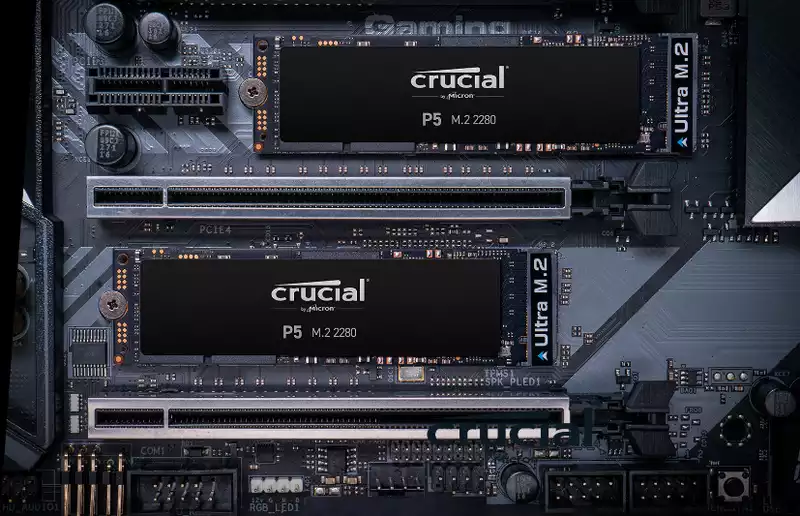It has taken a few weeks since they were first announced, but Crucial's performance-oriented P5 SSDs are now available for purchase in the US and UK. These are relatively fast SSDs (in the PCIe 3.0 realm) and are priced accordingly.
Crucial announced the P5 series in late April, claiming that they are built for "serious gamers and creative professionals" who need "quick response times." They are built around 96-layer triple-level-cell 3D NAND flash memory chips manufactured by Crucial's parent company, Micron, and combined with its own controller.
Buyers can choose from a variety of capacities, including 250GB, 500GB, 1TB, and 2TB; all four drives boast rated sequential read speeds of up to 3,400MB/sec, and all but the 250GB model have rated sequential write speeds (the 250GB model can write at up to 1,400MB/sec). [This puts the P5 series in the upper echelon of PCIe 3.0 SSDs, but not quite in the top class. Samsung's 970 Evo Plus, for example, delivers up to 3,500 MB/sec and 3,300 MB/sec read and write, respectively. Of course, PCIe 4.0 models raise the bar with read and write rates in the neighborhood of 5,000 MB/sec on supported platforms (AMD X570 and B550).
Prices in the US and UK are as follows:
Because these are fast drives (PCWorld has benchmark data), they are more expensive than more affordable options on the market, such as Intel's 660p and Crucial's P1 and P2 lines The price. Nevertheless, the price is nearly identical to Samsung's 970 Evo line, with the exception of the 2TB model, which sells for $349.99 on Newegg.
For gaming applications, there is little difference between the super-fast SSDs and the lower-spec models. At least for now, a 2.5-inch SSD offering speeds of 550-580 MB/sec is sufficient for gaming. Whether this will change as developers become more accustomed to optimizing their games for next-generation consoles with built-in SSDs (Xbox Series X and PlayStation 5) remains to be seen.
Other tasks where such high speeds are demonstrated on a PC are in moving large files or moving many files together. Also, compared to 2.5" SSDs, M.2 form factor drives (either SATA or NVMe) are more sophisticated and do not require cabling.
Thanks, OC3D
.

Comments